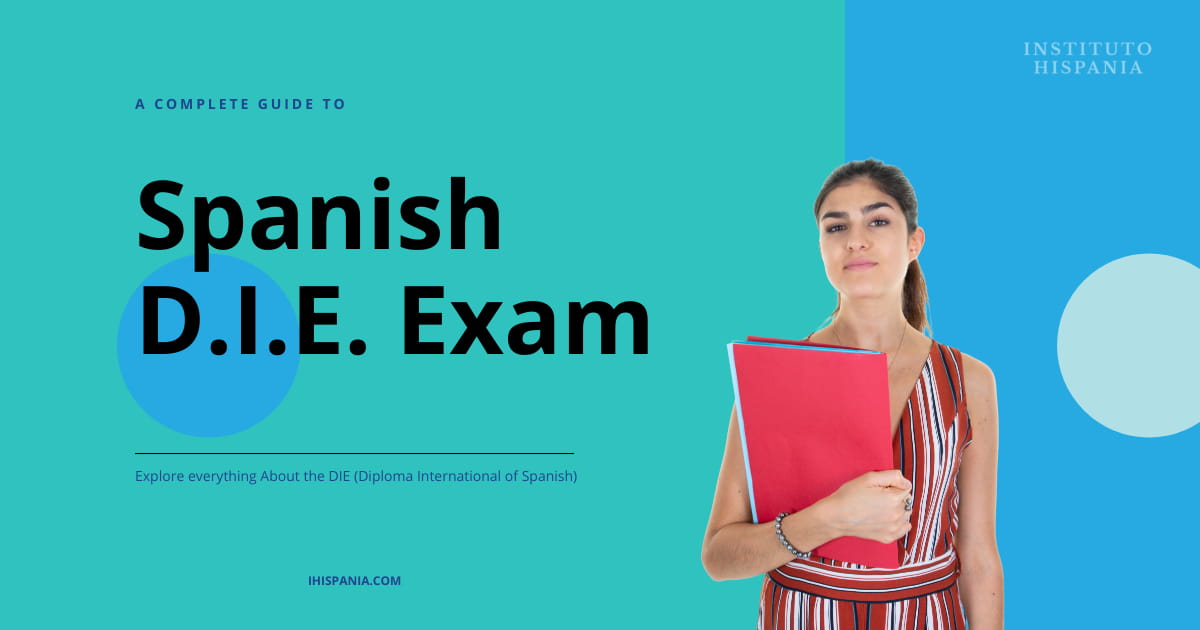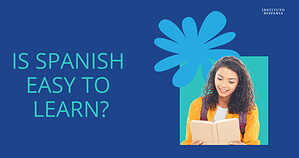Do you want to know how good you are at Spanish? Then take the D.I.E. (Diploma Internacional de Español) Test.
In this ultimate guide, you’ll find all the details of the Spanish DIE exam. It covers test structure, format, validity, benefits, dates, fees, scoring, test centers, how to prepare, and much more.
Let’s take a closer look!
TABLE OF CONTENTS
- What is DIE (Diploma International of Spanish)?
- Benefits of the Spanish DIE exam
- Everything About the DIE
- How to prepare for the DIE?
What is DIE (Diploma International of Spanish)?
DIE (Diploma Internacional de Español) is another well-known Spanish language test internationally recognized. It offers 10 levels of proficiency, from beginner to advanced.
The DIE test allows Spanish learners to choose conversation topics that interest them the most. So you can prove and show your language skills and measure your Spanish in the health, tourism, and business fields.
The test evaluates the candidate’s ability to communicate effectively with other Spanish speakers.
It may not have the same appeal as DELE and SIELE. Still, it is gaining popularity. Today, it is accepted in many places where Spanish certificates are required.
Who conducts the DIE examination?
The FIDESCU (The Foundation for the Development and Research of Spanish Culture), a non-profit organization, conducts D.I.E. It works under the Ministry of Education of the Government of Spain.

Spanish is widespread, with over 500 million native speakers and 21 Spanish-speaking nations. So, as an outcome, they created it in 1996 to promote the across-the-board Spanish language and culture worldwide.
FIDESCU is involved in many activities. For instance, they conduct exams, offline & online courses, organize cultural events, exchange programs, offer linguistic services, etc.
The reputed Honorary advisory board comprises experts in diverse cultural fields. The Universidad Pontificia de Salamanca of Spain, in cooperation with FIDESCU, developed the DIE exam.
Universidad CEU San Pablo, Católica de Ávila, redPEA, Colegio Virgen de Europa, and RED PEA of UNESCO are other institutions that support DIE.
Benefits of the Spanish DIE exam
The advantages of the Spanish DIE test are many.
If you have been learning Spanish for a while, it can help you know your current ability. And knowing your level, even a rough idea, can help you identify your shortcomings.
Afterward, you can work on your flaws, study, and improve for your next Spanish test. It raises your self-esteem, makes you more confident, and encourages you to continue studying Spanish.
DIE is tied with CEFR language system levels, A1 to C2, making it easier to understand.
The DIE diploma is globally acknowledged. Almost all businesses and organizations accept it. The certificate can enhance your job prospects requiring Spanish and add excellent value to your CV.
Would you like to study, work, or settle abroad in a Spanish-speaking country?
Although DIE isn’t required and is admitted everywhere, still, it can give you an edge.
An extra point or increase in your chances of obtaining a study visa or work permit can boost your chances of success. For example, you are entering university, employment, or moving to a Hispanic country.
There are a few more incentives. For example, certification is forever valid, and you can take the test whenever you want. The modular test format is also flexible for candidates.
DIE covers all kinds of Spanish and is not based on a specific variant. Instead, it includes all Spanish language varieties, dialects, accents, phrases, and varieties used in different Spanish-speaking countries.
Since DIE has much usefulness, it is worth your time and effort. Further, you have nothing to lose by taking it. There are no cons to it, only pros! Short answer: yes, go for it; you won’t regret it!
Everything About the DIE

Let’s find out everything about the DIE (Diploma Internacional de Español).
Who can take the DIE exam?
All those who know Spanish and are interested in gaining the certification measuring their language ability can take the test.
Any person above the age of 7 is eligible to take the test. So from children and adults to hobbyists and professionals, anyone can take to prove their Spanish competency.
Test format
The DIE test evaluates written and oral communication. So, you can pick either or both of the exams.
The teacher-examiners carry out the speaking exams in a personalized way. This makes it convenient and flexible for test takers.
6 written, 10 oral, and 3 specializations make up the DIE and range from elementary to mastery or specialization.

The test grading criteria cover speaking fluency, pronunciation, grammar, vocabulary, and comprehension.
Types of DIE tests and levels
The DIE levels adhere to the guidelines of CEFRL (Common European Framework of Reference for Languages). As a result, the levels range from A1 to C2.
The 6 DIE levels are Certificado Elemental (A1), Certificado Básico (A2), Certificado Intermedio (B1), Certificado Avanzado (B2), Certificado Superior (C1), and Certificado Dominio (C2).
The oral test has a total of ten levels. From A1 to B2, each stage has two sublevels. And for C1 and C2, there is only one level each.
For writing, it has 6 levels — Elemental, Pre-intermediate, Intermediate, Advanced, Superior, and Mastery.

You do not get all levels before achieving 10. You can sit for the exam most appropriate to your current Spanish language ability.
Specialized DIE tests
Besides general Spanish, DIE has specialized tests at different levels for various goals. It recognizes Spanish competency and helps to gain the certification of detailed knowledge of a particular field.
It has Medical Spanish (levels B2 & C1), Spanish for Tourism (levels B2 & C1), and Business Spanish (levels B2, C1 & C2). The specialized test does not cover A1, A2, and B1.
Test structure, description, and syllabus
The candidate must select different levels for the oral and written exams, depending on their Spanish language skills.
The speaking tests have 2-4 different tests on the topics or given texts per level.
Each written test has 4 separate tests. E.g., listening comprehension, reading comprehension, Spanish use, and written expression and interaction.
You can check the complete syllabus on the site.
Test duration
The oral test lasts (6-7 minutes for A1), (12 minutes for A2), (16 minutes for B1), (21 minutes for B2), and (25 minutes for C1 and C2).
The written test comprises (90 minutes for A1), (110 minutes for A2), (130 minutes for B1 and B2), and (150 minutes for C1 and C2).
Evaluation and Scores
The total marks are 100 points. A candidate needs at least a score of 65% to get the DIE diploma.
The candidate earns a diploma with distinction for a score of 85% or above. This can help with the promising future of Spanish careers.
One must score a minimum in each evaluation criterion to pass the DIE test.
Suppose candidates pass only one test, oral or written. Then, they will receive the diploma corresponding to the part passed.
Testing centers worldwide
You can also select either online or face-to-face modes in Spain or approved centers outside the country. Both options are available.
As of January 2023, there are over 50 exam centers in 24 countries across 5 continents. You can check the entire list on the official FIDESCU site.

Instituto Hispania is one of the official DIE centers in India. So, interested Spanish learners can take the test in one of the four official centers.
Test and result dates
DELE (Diplomas de Español Como Lengua Extranjera) only occurs a few times a year. In contrast, they conduct the DIE exam throughout the year, so candidates can decide which one to choose.
The test dates are not fixed and vary. For exact dates, you can get in touch with the nearest or desired test centers.
You need to register for the test 1-2 weeks in advance. Thus, check with the center of your choice as per your schedule.
After giving the test, you can check the oral test results on the same day. FIDESCU announces the written examination results within 30 to 40 days of the test date.
And finally, they send the final diploma along with scores and all details within 60 to 90 days of the exam dates.
Validity of the DIE Diploma
Unlike Spanish SIELE, valid for 5 years, DIE scores and certifications are valid for life. So once you pass the test, your diploma will have lifelong validity.
Some companies and organizations only consider the last 5-year diploma for the officially counted. So, you may need to retake it if required.
But the good news is that most admit it irrespective of when you passed.
Fees for the DIE
The DIE test cost differs from 35 to 60 euros. The price will change depending on the level, types of tests, and centers you sign up for.
To get a rough estimate, check the price table below.

How can I register?
You can contact your nearest center to register for the DIE test.
The approved centers of FIDESCU will provide you with all the information about the registration process for various levels and test types.
How to prepare for the DIE?
On the official website, i.e., fidescu.org/diploma-d-i-e, you can find plenty of sample papers, previous questions, and practice sets. Here is the link for the same — content.
The best way to learn and prepare for the DIE test is through teachers. Also, you can take the help of books, audio podcasts, learning apps, movies, and music to enhance your Spanish skills.
We have a rich catalog of offline and online Spanish courses designed for various levels and needs. From absolute beginner to expert level, we have something for everyone.
You can enroll at Instituto Hispania in Delhi, Chennai, Mumbai, and Pune. And as a bonus, you can get your DIE international diploma from us since we are authorized DIE test centers.
Are you planning to take the DIE exam? If you have any questions, you can share them in the comments below!









I am interested in taking test